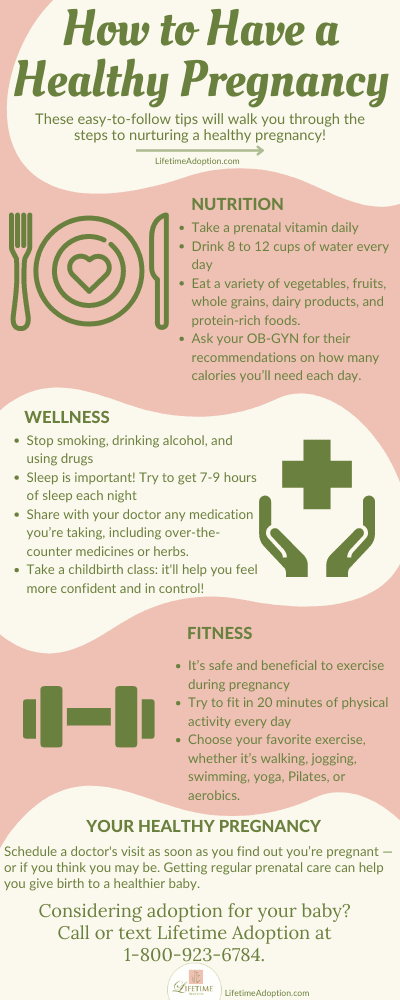
Getting prenatal care, eating the right foods, regularly exercising and quitting smoking and drinking are all important to increase your chances of a healthy pregnancy. These easy-to-follow guidelines will walk you through the steps to nurturing a healthy pregnancy.
Your Pregnancy Nutrition
During pregnancy, it is important to eat right, because you are truly eating for two. This doesn’t mean you need double the food, but you definitely need to plan to eat the right foods for a balanced diet. Here are seven simple tips to eat a nutritious, nourishing diet when you’re pregnant:
- Take a prenatal vitamin each day, and ask your doctor if you should also take a vitamin D supplement.
- Get more folic acid by eating foods like kidney beans, leafy green vegetables, lentils, citrus, and whole grains. All are good sources of folic acid, which can help prevent birth defects like spina bifida.
- Choose wisely: eat foods and drink beverages with less added sugars, saturated fats, and sodium (salt).
- Watch your water intake: It’s important for both you and your baby that you drink enough water during your pregnancy. You’ll know when you’re properly hydrated if your urine is pale yellow. Try to drink 8 to 12 cups (64 to 96 ounces) of water every day. Water helps you digest food and helps form the amniotic fluid around your baby.
- Get creative: if you find it difficult to get your 8 glasses into your diet, try flavoring water with lemon. Try some new recipes to add in your favorite veggies and fruits. Even a big salad or Chinese stir fry can go a long way toward meeting your daily needs.
- Get nutritional advice from your doctor. During pregnancy, you’ll need extra calories to keep you and your baby strong and healthy. Ask your OB-GYN for their recommendations on how many calories you’ll need each day.
- Eat an assortment of vegetables, fruits, whole grains, fat-free or low-fat dairy products, and protein foods.
Planning healthy snacks will be beneficial throughout your pregnancy to keep morning sickness at bay and to ensure that the calories you eat are full of the nutrients you need while you are growing a little one.
Here are some ideas for easy, healthy snacks to keep on hand:
- String cheese and apples
- Granola bars (high fiber are best!)
- Toast and peanut butter
- Cheese and crackers
- Nuts and raisins
- Graham crackers and milk
- Tuna and crackers
- Celery and carrots with ranch dressing
Your Pregnancy Wellness
See your doctor regularly for prenatal visits to monitor your health and the health of your baby. Get screened and treated for STDs, HIV, blood sugar, and/or high blood pressure. Make sure to share with your doctor about any medications you might be taking and or drug/alcohol use.
Visit your dentist so they can check your current oral health and make a dental plan for the rest of your pregnancy. When you take care of your teeth and gums, it can make a difference for your baby, both before and after birth. In addition, here are 10 tips to increase your pregnancy health and wellness:
- Sleep is important when you’re pregnant. Lack of sleep during pregnancy has been linked to complications, including preeclampsia. So try to get seven to nine hours of sleep each night. This is a key step to wellness!
- It is fine to eliminate stress in your life. Drop out of obligations or activities that drain you emotionally and physically. Set limits with others that ask too much of you. This is the time to be calm and focus your energy on growing a healthy baby!
- Avoid drinking alcohol and taking drugs. Stopping smoking, drugs, and alcohol are always the best choices. If you are struggling, begin by focusing on reducing your consumption rather than going cold turkey. Ask your doctor about safe methods for how to stop using while you’re pregnant.
- Maternity clothes designed for your changing shape will help you feel better about your appearance. If you need some help getting maternity clothes, visit BirthmotherBlessing.com to can request some at no cost to you!
- Ask your doctor what medicines are safe during pregnancy. Tell him or her about ANY medication you’re taking, including over-the-counter medicines or herbs. Some may cause birth defects.
- Rest whenever possible, because growing a human is no small feat and will drain a lot of your energy! Taking the time to rest when you can helps.
- Learn about the early signs of labor so you’ll know what to expect. Cleveland Clinic has published this handy guide: Signs That Labor Is 24 to 48 Hours Away.
- Take a childbirth class. Usually, the hospital you plan to delivery at will offer a tour of the labor & delivery area, and provide childbirth info. Being proactive and learning all about childbirth before you go into labor will help you feel more in control and confident!
- Avoid watching shows or reading stories that make you feel nervous. Watching labor and delivery “reality shows” and reading uninformed websites can distort your view of how the process really is. These shows and websites often focus on the scary and the intense and are very unlikely to help you relax. It’s good to remember that the majority of births worldwide are healthy and normal.
- Create your adoption hospital plan with your Adoption Coordinator’s help. This plan allows the adoptive family, the hospital staff, and Lifetime to know exactly how you want the hospital visit to be handled.
Your Pregnancy Fitness
It’s both safe and beneficial to exercise and do physical activities during pregnancy. Women who exercise while they’re expecting will have fewer issues with varicose veins and heartburn, and a reduced risk of gestational diabetes and hypertension. Unless your doctor has advised you not to, you can do activities like swimming, walking, dancing, and prenatal yoga.
The American College of Obstetricians and Gynecologists (ACOG) recommends that pregnant women with no complications try to fit in 150 minutes of moderate-intensity aerobic activity each week (that’s only about 20 minutes every day). Exercise keeps your body strong and flexible. Choose whichever type of pregnancy exercise that’s right for you, whether it’s walking, jogging, swimming, yoga, Pilates, or aerobics. However, avoid risky activities like contact sports, hot yoga, scuba diving, downhill skiing, and horseback riding.
Exercise, even if you never have, will help you during labor and delivery. Try to fit in light or a moderate walk three to four days a week. If you didn’t work out before your pregnancy, a walk around the block is a great start! The simple act of walking does wonders for your wellness. If possible, walk 30 minutes or more every day, outdoors if you can. Walking allows your body to strengthen and removes toxins; it can also clear your mind with the extra oxygen and attention to the environment.
Just make sure to share your exercise plans with your doctor, who can provide you with recommendations specialized to you and your pregnancy.
Your Healthy Pregnancy
Make sure to schedule a visit with your doctor as soon as you find out you’re pregnant — or if you think you may be. During your pregnancy, you’ll have many checkups with your doctor or midwife. These appointments are all important, so try not to miss any of them.
If you need help getting prenatal care, call or text Lifetime Adoption at 1-800-923-6784. Caring Adoption Coordinators are ready to answer your questions and help you find the medical care you need during pregnancy.
As Vice President of Lifetime Adoption, Heather Featherston holds an MBA and is passionate about working with those facing adoption, pregnancy, and parenting issues. Heather has conducted training for birth parent advocates, spoken to professional groups, and has appeared on television and radio to discuss the multiple aspects of adoption. She has provided one-on-one support to women and hopeful adoptive parents working through adoption decisions.
Since 2002, she has been helping pregnant women and others in crisis to learn more about adoption. Heather also trains and speaks nationwide to pregnancy clinics to effectively meet the needs of women who want to explore adoption for their child. Today, she continues to address the concerns women have about adoption and supports the needs of women who choose adoption for their child.
As a published author of the book Called to Adoption, Featherston loves to see God’s hand at work every day as she helps children and families come together through adoption.





0 Comments